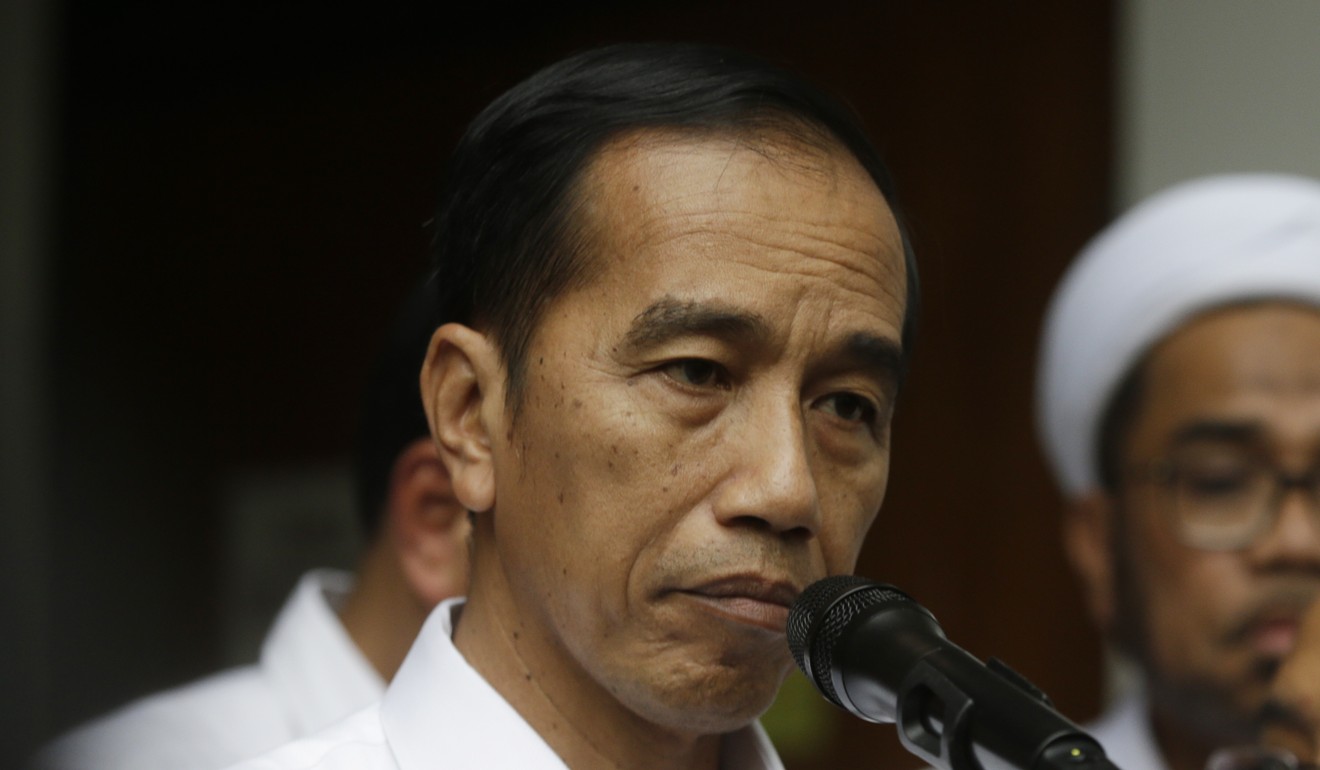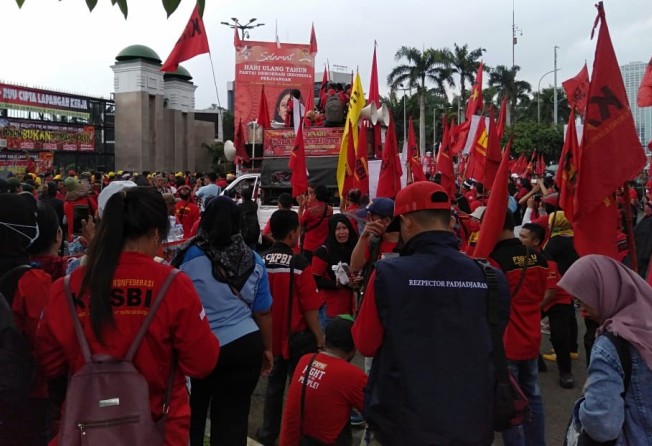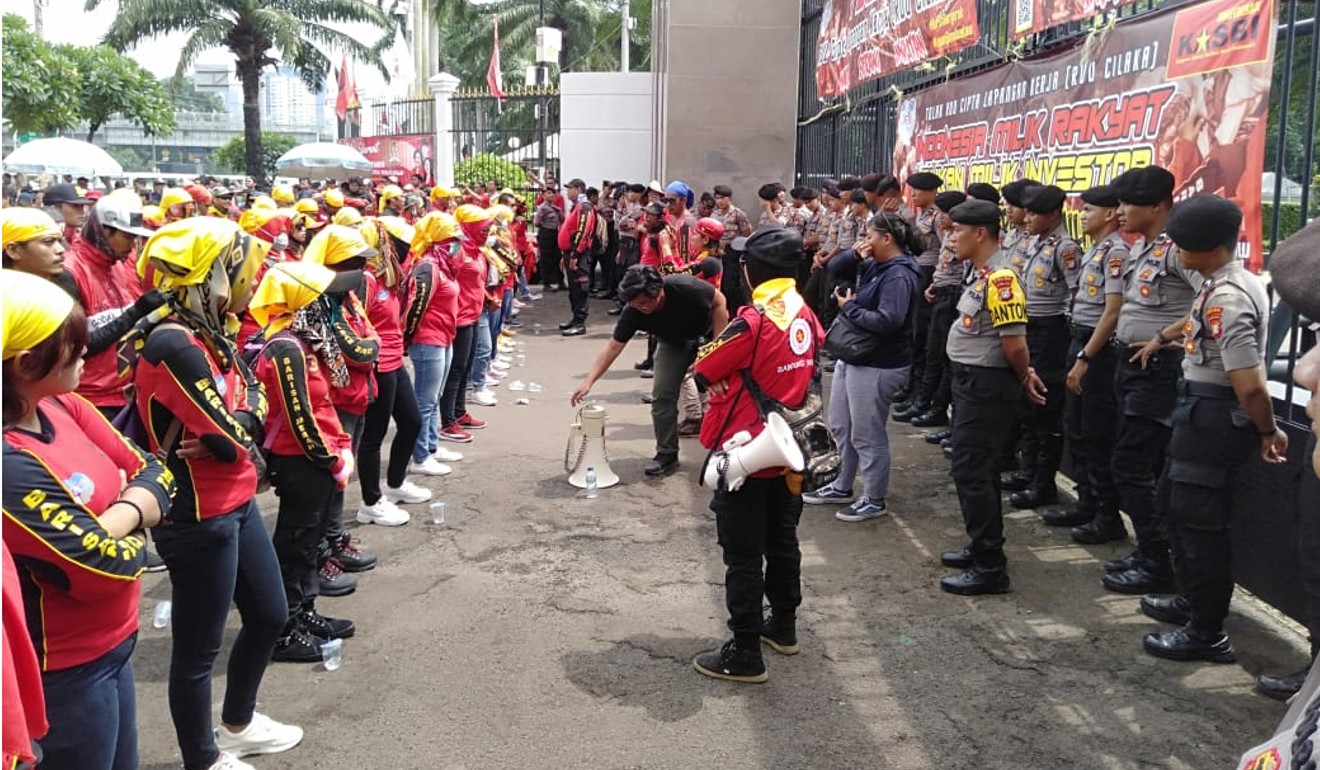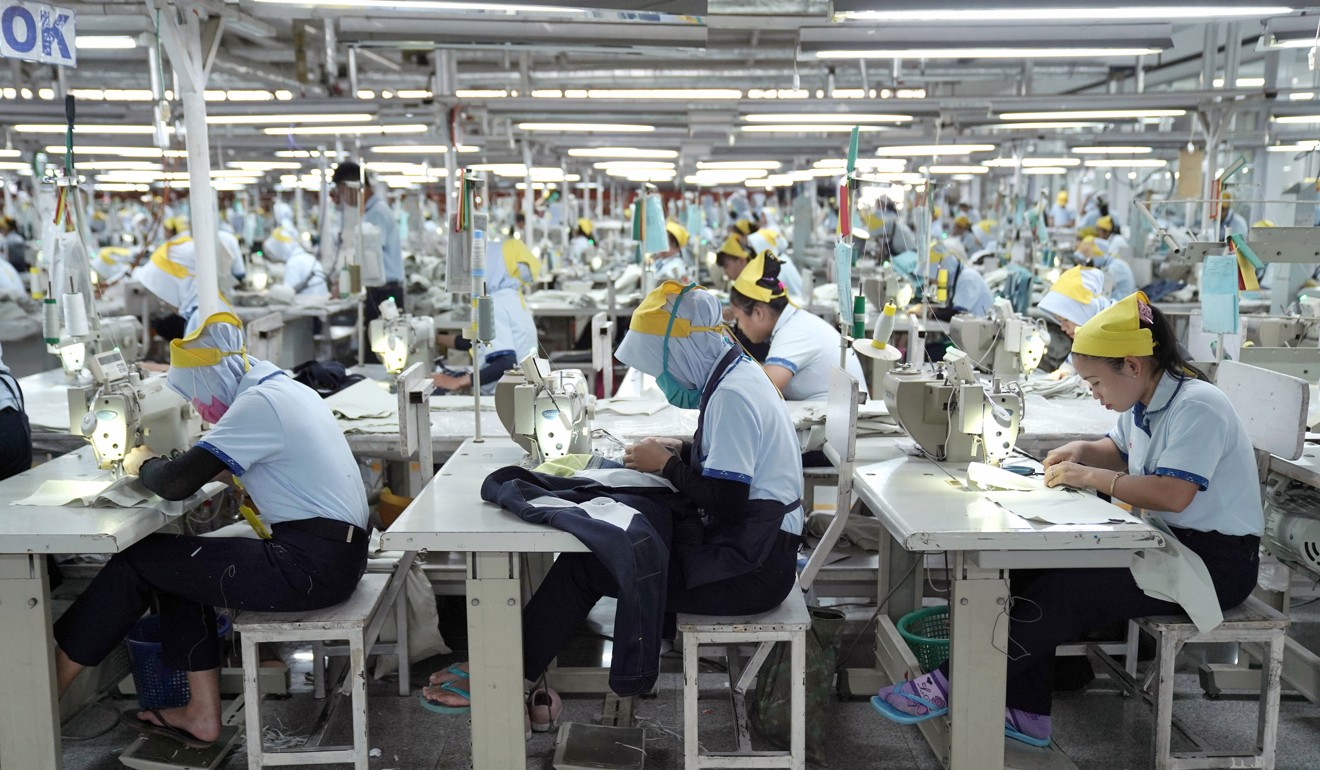
Indonesian unionists threaten to paralyse Jakarta over Omnibus jobs law they say will cut minimum wage
- Workers brave forecasts of torrential rain to gather outside House of Representatives
- Joko Widodo’s government says law is needed to attract investment and boost job growth; workers fear it will take away their rights

Braving forecasts of torrential rain, workers from a coalition of labour unions gathered outside the House of Representatives in the Indonesian capital of Jakarta on Monday, to protest against a new law they believe will cut severance pay and the minimum wage.
While the unions are demanding that lawmakers scrap the Omnibus Bill on Job Creation, the government of President Joko Widodo remains unmoved, despite multiple demonstrations and a strike in the capital last week setting up a showdown for when lawmakers return from recess on January 20.
The government insists the bill is required to scale back labour regulations that are blocking investment and job growth in Southeast Asia’s largest economy.
While the unions have not been privy to the draft law, they believe it will affect severance pay, working hours and the minimum wage, all of which are sensitive issues among workers and low-income Indonesian families.
Labour protests were also held on Monday in the provinces of East Java, Central Java and South Sumatra and the unions have promised greater and more intense protests in the coming days.
Union leaders have threatened to mobilise tens of thousands of protesters on January 20 to paralyse Jakarta’s commercial and business districts, as they have done in the past.

“The omnibus law is only going to do away with minimum wages, do away with severance pay, render outsourcing and uncontracted work widespread, allow unskilled foreigners to enter, eliminate social guarantees and remove criminal sanctions for employers who neglect the rights of workers,” said Said Iqbal, chairman of the Confederation of Labour Unions.
Indonesia’s labour force contained 134 million people as of August 2019, according to the International Labour Organisation.

While many lawmakers generally support the bill, which could be introduced as early as next week, the unions have significant political influence within the House, despite Widodo’s governing coalition holding 74 per cent of the seats.
Though the forecast rains never materialised beyond an occasional drizzle, the protest snarled traffic around the parliament complex near central Jakarta.
Indonesian police stood by passively as the protest evolved, with hundreds of demonstrators carrying red union flags and placards marching to the main gate, giving speeches and shouting their demands.
“We deliberately demonstrated in front of the parliament today because this will go to the legislative body,” said protest leader Nining Elitos, chairwoman of the Congress of the Indonesian Union Alliance. “We’re reminding them to stop all regulations that do not favour the people.”
Some analysts say the Labour Law of 2003 needs an overhaul to improve Indonesia’s sluggish economy to the benefit of everyone. Under the current law, Indonesian workers have some of the best severance packages in the world and immense legal protections from dismissal – at the expense, and to the frustration, of both foreign and Indonesian companies.
“The full year 2019 fiscal account saw revenues and spending fall, as percentages of GDP, relative to 2018. Amid a lack of assertive governance reform, the state sector continues to perform sluggishly, complicating development,” said Kevin O’Rourke, founder of Reformasi Weekly Review, a private circulation e-newsletter about Indonesia.

“The administration is increasingly on course for a collision with labour unions,” he said. “If the demonstrations are indeed sizeable, disrupting traffic and business in Jakarta, it would fall on Widodo to decide whether to proceed – overriding the opposition of unions – or stall and capitulate.”
The World Bank ranked Indonesia 73rd in its last Ease of Doing Business survey, well below neighbouring Vietnam, Malaysia and Singapore and just above Costa Rica, Jordan and Peru. Indonesia was also ranked 140th of 190 countries in the category of ease of starting a business.
In its publication “Doing Business 2020”, the World Bank noted that: “Strict employment protection legislation shapes firms’ incentives to enter and exit the economy.”
Widodo, a domestically-minded president who was elected twice on promises of an open economy with huge infrastructure projects and job creation – both of which need more foreign and domestic investment – knows this all too well.
The president, who was in the United Arab Emirates on Monday as part of a two-day visit to drum up Middle East investment, has instructed his cabinet to expedite the completion of the labour legislation by next week, when lawmakers reconvene, and not waste time debating irrelevant articles that could slow down its passage.

But Widodo’s urgency to push through the bill is one of the labour unions’ biggest grievances: that they weren’t consulted on its drafting.
“He promised to the labour unions that the government has to discuss with us before implementation of any new labour law, but the Ministry of Manpower invited only nine or 10 confederations, not all the confederations, the federations and unions,” said Timbul Siregar secretary general of the All-Indonesian Workers Union. “He promised us, but the manpower ministry did not follow this promise.”
He added: “We have firm opinions about working hours, the social security of workers, legal processes for hiring and firing, or lay-offs. What we want is transparency. We don’t even have a copy of the draft – we are basically blind.”